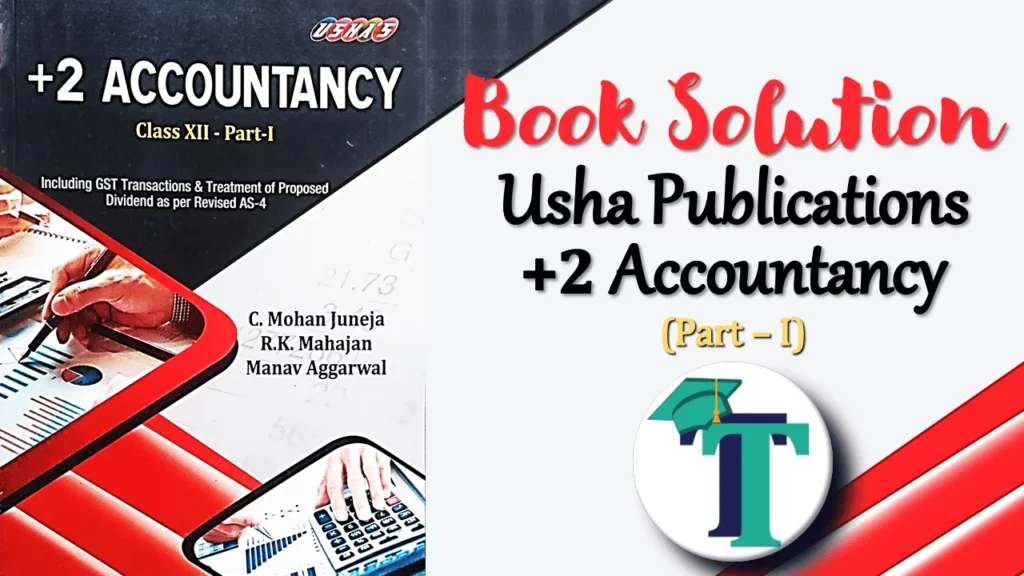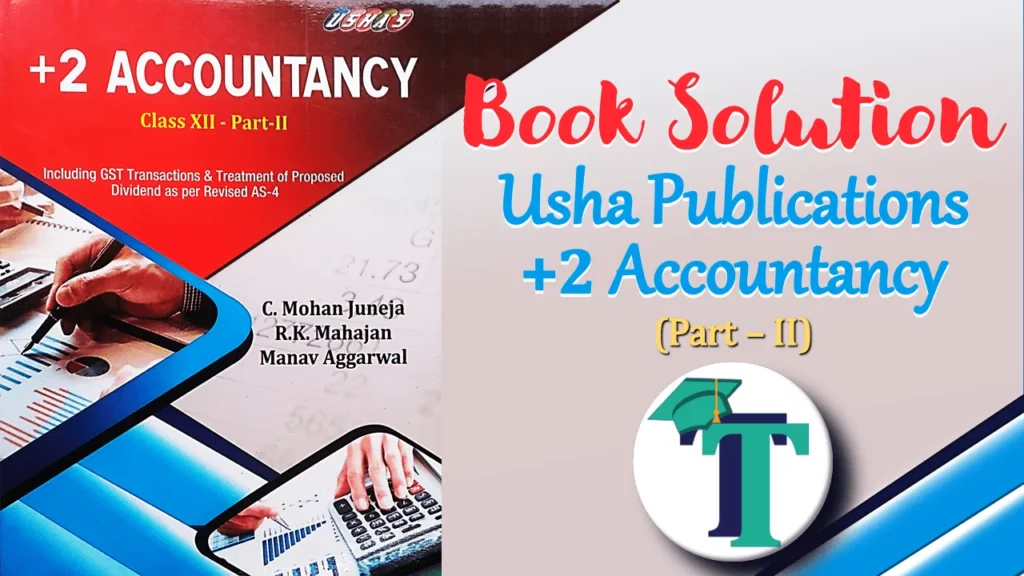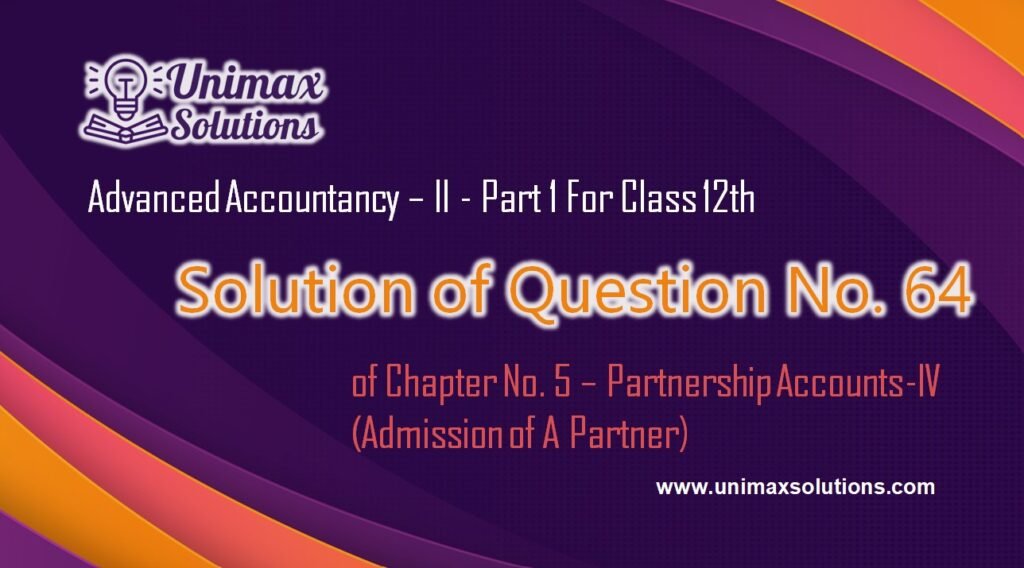
Advertisement
Question 64 Chapter 5 – Class 12 Part 1 Unimax
64. A, B and C are partners in a firm sharing profits and losses in the ratio of 6 : 5 : 3 respectively. Their Balance Sheet on 1st January, 2021 was as follows : –
| Liabilities | Amount | Assets | Amount |
| Sundry Creditors | 9,000 | Land and Building | 24,000 |
| Capital : | Furniture | 3,500 | |
| A | 19,000 | Stock | 14,000 |
| B | 16,000 | Debtors | 12,600 |
| C | 8,000 | Cash | 900 |
| Bills Payable | 3,000 | ||
| 55,000 | 55,000 |
They agreed to take D into partnership and give him a share of 1/8th on the following terms :
- That D should bring in Rs. 4200 as goodwill and Rs. 7000 as his capital.
- That furniture be depreciated by 12%.
- That stock be depreciated by 10%.
- That a reserve of 5% be created for doubtful debts.
- That the value of land and building be brought upto Rs. 31000.
- That after making the above adjustments the capital accounts of the old partners (who continue to share in the same proportion as before ) be adjusted on the basis of the proportion of D’s capital to his share in the business i.e. actual cash to be paid off to or brought in by the old partners as the case may be.
Give Journal Entries to record the above and Balance Sheet after D’s admission.
The solution of Question 64 Chapter 5 – Class 12 Part 1 Unimax: –
Journal

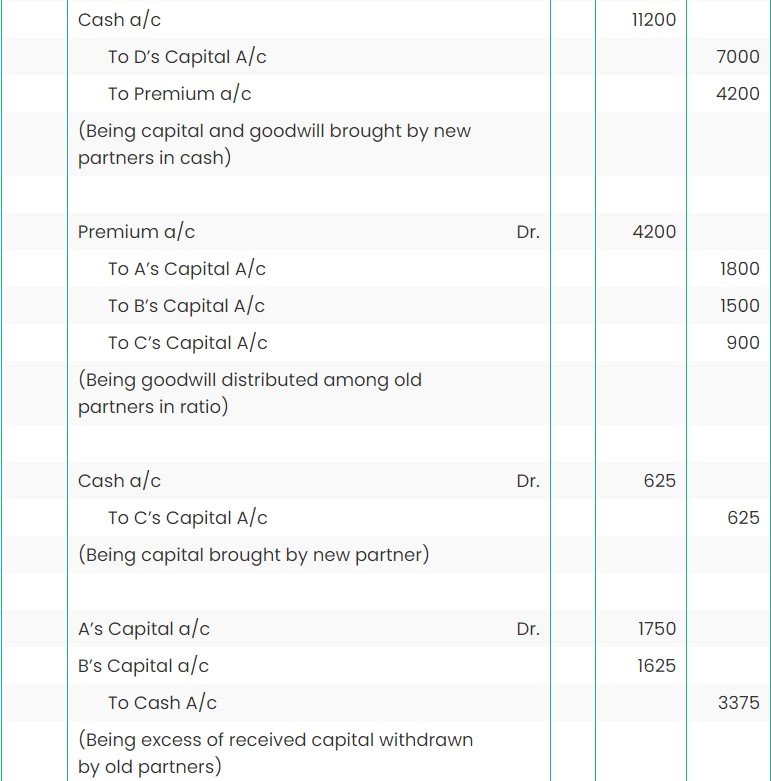
Revaluation A/c

Capital Accounts
Advertisement
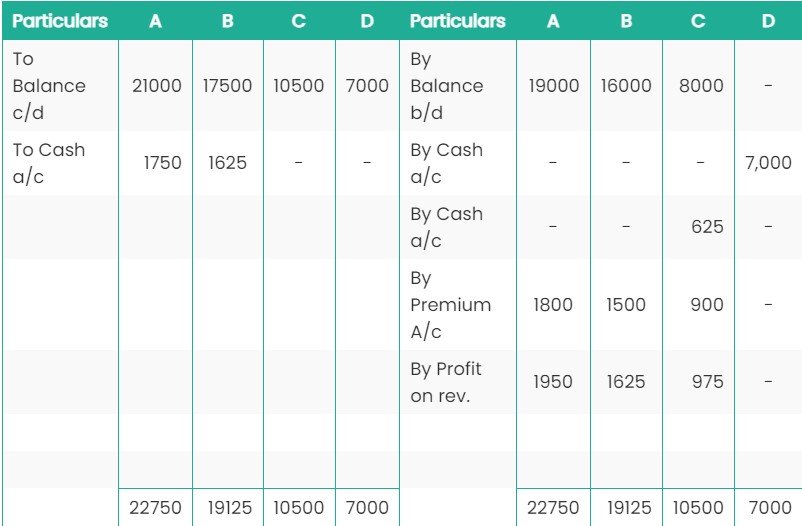
Balance Sheet

Working Note:
(A) Calculation of New PSR :
Let Total Profit = 1
D’s share = 1/8
Advertisement
Remaining Share = 7/8
A’s new share = 6/14 X 7/8 = 6/16
B’s new share = 5/14 X 7/8 = 5/16
C’s new share = 3/14 X 7/8 = 3/16
New PSR = 6 : 5 : 3 : 2 (New PSR)
(B) Calculation of Capitals of Partners :
Total Capital of firm = 7000 X 8/1 = Rs. 56000
(i) A’s req. capital = 6/16 X 56000 = Rs. 21000
A’s actual capital = Rs. 22750
A will withdraw Rs. 1750
(ii) B’s req. Capital = 5/16 X 56000 = Rs. 17500
B’s actual capital = Rs. 19125
B will withdraw Rs. 1625
(iii) C’s req. capital = 3/16 X 56000 = Rs. 10500
(C) Sacrificing Ratio will be 6 : 5 : 3 in case if nothing is mentioned in question except new partner’s share, it is assumed.
C’s actual capital = Rs. 9875
C will introduce = Rs. 625
(iv) D’s capital = 2/16 X 56000 = Rs. 7000
End of Solution
Check Out the Solution of all questions for this chapter:
The solution to all questions of Chapter No. 5 – Partnership Accounts-IV (Admission of A Partner) Class 12 Unimax is shown as follows, click on the image of the question to get the solution.
Check out all books for PSEB
Question 2 Chapter 5 – Class 12 Part 1 Unimax
Advertisement
1. Comprehensive Solutions for All Chapters of Advanced Accountancy Part 1 Class 12 by Unimax
UnimaxSolutions.in offers a comprehensive solution for students studying Advanced Accountancy Part 1 in Class 12. With their meticulously curated study material, students can access comprehensive solutions to all the questions in each chapter. By selecting the chapter name from the study material, students can easily navigate through the topics and find detailed explanations and step-by-step solutions to the problems presented in that section. Whether it’s understanding complex accounting concepts, mastering calculation techniques, or analyzing financial statements, Unimax provides a valuable resource to aid students in their learning journey. With these comprehensive solutions at their disposal, students can enhance their understanding, clarify doubts, and improve their problem-solving skills in Advanced Accountancy, ensuring they are well-prepared for their Class 12 examinations.
- Chapter No. 1 – Accounts of Non-Profit Organisations
- Chapter No. 2 – Partnership Accounts – I (Basic Concepts)
- Chapter No. 3 – Partnership Accounts – II (Goodwill)
- Chapter No. 4 – Partnership Accounts – III (Change in Profit Sharing Ratio among Existing Partners)
- Chapter No. 5 – Partnership Accounts – IV (Admission of A Partner)
- Chapter No. 6 – Partnership Accounts – V (Retirement and Death of A Partner)
- Chapter No. 7 – Partnership Accounts – VI (Dissolution of Partnership Firm)
2. Comprehensive Solutions for All Chapters of Advanced Accountancy Part 2 Class 12 by Unimax
UnimaxSolutions.in presents an exceptional resource for students studying Advanced Accountancy Part 2 in Class 12. With their comprehensive study material, students can conveniently access extensive solutions to all the questions in each chapter. By simply selecting the desired chapter from the study material, students can effortlessly navigate through the topics and gain access to detailed explanations and step-by-step solutions to every problem presented in that particular section. Whether it involves understanding intricate accounting principles, honing calculation techniques, or analyzing complex financial statements, Unimax provides a valuable tool to support students in their learning journey. Equipped with these comprehensive solutions, students can enhance their comprehension, resolve any uncertainties, and strengthen their problem-solving abilities in Advanced Accountancy, empowering them to excel in their Class 12 examinations with confidence.
- Chapter No. 1 – Company Accounts (Share Capital)
- Chapter No. 2 – Issue of Debentures
- Chapter No. 3 – Redemption of Debentures
- Chapter No. 4 – Financial Statements of a Company (Balance Sheet Only)
- Chapter No. 5 -Financial Statement Analysis
- Chapter No. 6 – Tools/Methods of Financial Analysis
- Chapter No. 7 – Ratio Analysis
- Chapter No. 8 – Cash Flow Statement
Punjab School Education Board (PSEB) Solutions of Usha Publication.
If you’re a student enrolled in the Punjab School Education Board Class 12, exploring a wide range of books to cover the syllabus thoroughly is essential. While the prescribed textbooks are undoubtedly valuable, supplementing your studies with additional resources can enhance your understanding and knowledge. Consider checking out other books that align with the curriculum, offering different perspectives and insights on the subjects you’re studying. These supplementary materials can provide you with alternative explanations, practice questions, and examples that may aid in clarifying complex concepts. Moreover, exploring diverse sources can expose you to various writing styles and viewpoints, fostering a broader understanding of the subjects. So, seize the opportunity to expand your learning by delving into other books that can complement your studies and contribute to your academic growth.
Advertisement

